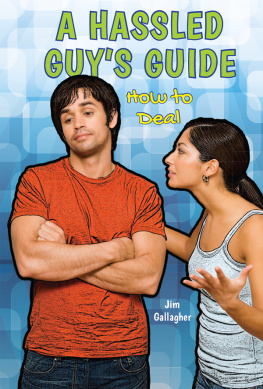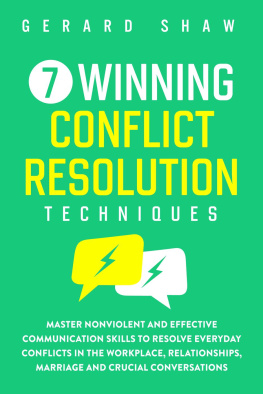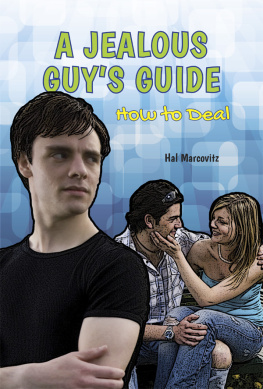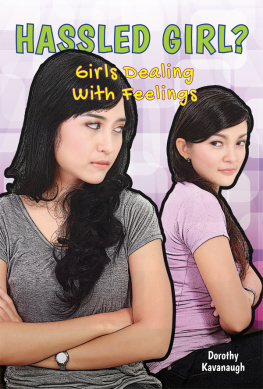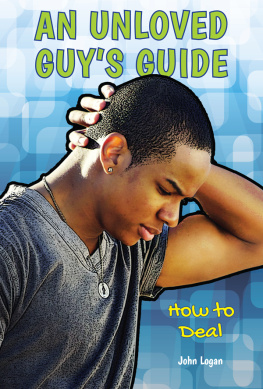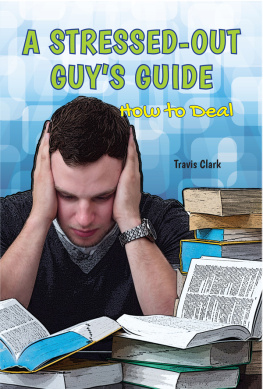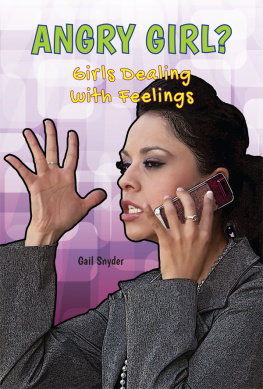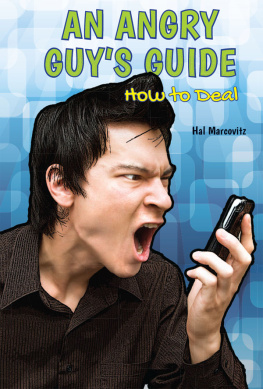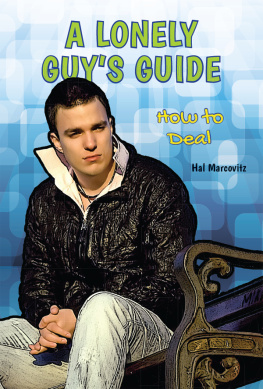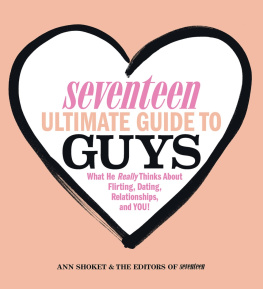Dont Let Conflict Destroy Your Relationships
When you are fighting with someone, do you lash out or give them the silent treatment? Neither of these strategies solve the problem, so what do you do? A Hassled Guys Guide: How to Deal discusses healthy ways to resolve conflict. Effective communication is the key. Discover your communication style, and take the first steps to improve how you deal with conflict so you can begin to mend your relationships.

All of the students in Mr. Ziffs tenth-grade English class are working on a group project related to the play Romeo and Juliet. The members of one groupMarco, Dan, Donald, and Melissacannot agree on how to do the assignment. Marco wants the group to rewrite a scene from the play so that it is set in modern times, and then act it out in class. However, Dan and Donald would prefer to write a report they can hand in. Melissa doesnt really like either idea.
Marco, Dan, Donald, and Melissa have a conflict. A conflict is what happens when there is a disagreement over two or more ideas, needs, desires, feelings, or expectations. In this case, the four students must figure out how they can work out their differences and do a good job on their project.
Everyone experiences conflict at one time or another. It is a normal part of life. But conflicts can become problems when they are not resolved in healthy ways. If people do not discuss and work out their differences, they can become tense, angry, and frustrated. In some cases, conflicts can even lead to violence.
When you are in your early teensa time when you are experiencing a jumble of emotions and powerful new feelingsconflict can be very difficult to manage. Sometimes, young people can feel so overwhelmed by pressure that they make some bad choices. For example, they try to escape from their problems by engaging in dangerous or harmful behaviors, such as drug or alcohol abuse. Some even have thoughts of suicide.
The good news is that you can learn the skills to manage or resolve conflicts in a healthy way. Learning how to handle conflict takes practice and training, but the skills involved are important and can be used throughout your life.
The greatest conflicts are not between two people but between one person and himself.
Garth Brooks

- in your personal relationships: with family, friends, and teachers
- in society: among people with different values or religions, or from different ethnic groups
- within yourself: when you have to make a hard decision or you learn something different from your previous beliefs
During a soccer game, Jeffs shot on goal smashed right into Carloss face. As Carlos staggered back, Jeff let out a laugh. Whats so funny? Carlos snapped. That hurt!
What? Cant you take it? snorted Jeff, as he scooped up the ball.
His heart pounding, Carlos glared at his opponent. His face was bright redboth from the impact of the ball and from anger. His hands tensed into fists.
Perhaps the reason that most people think of conflict in negative terms is because it can be a very unpleasant experience. When a disagreement starts, you suddenly experience a rush of strong feelingsyour emotions. The most common emotion associated with conflict is anger. However, other feelings may include disgust, contempt, fear, anxiety, shame, guilt, and sadness.
Anger is a powerful emotion that can have a wide range of intensities. You might say that you are angry when you are merely irritated about something. But you use the same word to describe being furious and in a rage. Disgust and contempt are two emotions that often accompany feelings of anger. Disgust refers to feelings of horrified distaste for something or someone. Contempt is a feeling that someone is inferior or does not deserve respect.
If you are in a conflict that lasts for a long period of time, you may also experience emotions of fear and anxiety over real or imagined danger. For example, worry and fear resulting from being teased and bullied at school can make some people become physically ill with intense headaches and overpowering nausea.
Two other emotions, shame and guilt, are also linked to conflicts, although they are rarely present during the heat of an argument. If you lose your cool during a disagreement, you may feel embarrassed afterward. This is especially true if people you like and respect witnessed your angry outburst. You may also feel guilty about having hurt a friend verbally or physically during a fight. These feelings can lead to feeling another powerful emotionsadnessfor your role in the conflict.
The mixture of emotions that accompany conflict can have a physical impact. Obviously, if you get into an argument that turns into a fistfight, you can get hurt. But conflicts that do not involve punching or other violence can cause physical changes in the body. After an unpleasant disagreement, you might feel exhausted or weak afterward. Conflict causes some teens to get headaches or stomachaches, and others to feel dizzy or lightheaded. Other symptoms related to problems with conflict are having trouble sleeping, difficulty concentrating, and worrying.

A part of everyones personality, emotions are a powerful driving force in life. They are hard to define and understand. But what is known is that emotionswhich include anger, fear, love, joy, jealousy, and hateare a normal part of the human system. They are responses to situations and events that trigger bodily changes, motivating you to take some kind of action.
Some studies show that the brain relies more on emotions than on intellect in learning and in making decisions. Being able to identify and understand the emotions in yourself and in others can help you in your relationships with family, friends, and others throughout your life.

When you become angry, your body responds by feeling strong and ready for action. As a result, you are more capable of physically defending yourself. Anger prepares us for action, explains psychology researcher Carroll E. Izard in The Psychology of Emotions (1991). It bolsters physical strength and courage to match the impulse to act. We may never feel stronger or more invigorated than when we are really angry. Many sociologists believe that the emotion of anger played an important role in the survival of the earliest human beings. Anger made these humans stronger and able to confront dangerous threats, such as wild animals or other enemies.

When you feel certain emotions, the body often responds in specific ways.
Anger and fear: increased heartbeat and an involuntary tensing of muscles
Shame: facial blushing and warmth in the upper chest or face
Sadness: tears, tightness in the throat, and heaviness in the limbs
Recently, fifteen-year-old Cody has been fighting a lot with his parents. Codys parents have been giving him a hard time about his clotheshe always wears a black shirt, jeans, and jacket. They criticize his hair, which is long and shaggy and often covers his eyes. Codys parents complain that he and his friends seem to spend all of their time on their skateboards.

